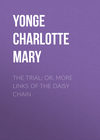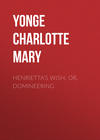Czytaj książkę: «The Long Vacation», strona 15
“Where did you meet the girl?” she said. Dolores told her the street.
“Ah! depend upon it the things were with Mrs. Crachett, who I know has done washing for people about on fair-days, when they can’t do it themselves. She has a daughter in my G. F. S. class; I wonder if we could get any help from her.”
It was a very odd device for a respectable associate and member of G. F. S. to undertake, but if ever the end might justify the means it was on the present occasion. Fortune favoured them, for Melinda Crachett was alone in the house, ironing out some pale pink garments.
“Are you washing for those people on the common, Melinda?” asked Miss Hackett.
“Yes, Miss Hackett. They want them by seven o’clock to-night very particular, and they promised me a seat to see the performance, miss, if I brought them in good time, and I wondered, miss, if you would object.”
“Only tell me, Melinda, whom you saw.”
“I saw the lady herself, ma’am, the old lady, when I took the things.”
“No young person?”
“Yes, ma’am. It was a very nice young lady indeed that brought me down this pink tunic, because it got stained last night, and she said her orders was to promise me a ticket if it came in time; but, oh my! ma’am, she looked as if she wanted to tell me not to come.”
“Poor girl! She is a G. F. S. member, Melinda, and I do believe you would be doing a very good deed if you could help us to get her away from those people.”
Melinda’s eyes grew round with eagerness. She had no doubts respecting what Miss Hackett advised her to do, and there was nothing for it but to take the risk. Then and there Dolores sat down and pencilled a note, directing Ludmilla to put on the red ulster after her performance, if possible, when people were going away, and slip out among them, joining Melinda, who would convey her to Miss Hackett’s. This was safer than for Gerald to be nearer, since he was liable to be recognized. Still it was a desperate risk, and Dolores had great doubts whether she should ever see her red Maori again.
So in intense anxiety the two waited in Miss Hackett’s parlour, where the good lady left them, as she said, to attend to her accounts, but really with an inkling or more of the state of affairs between them. Each had heard from New Zealand, and knew that Maurice Mohun was suspending his consent till he had heard farther from home, both as to Gerald’s character and prospects, and there was no such absolute refusal, even in view of his overthrow of the young man’s position, as to make it incumbent on them to break off intercourse. Colonial habits modified opinion, and to know that the loss was neither the youth’s own fault nor that of his father, would make the acceptance a question of only prudence, provided his personal character were satisfactory. Thus they felt free to hold themselves engaged, though Gerald had further to tell that his letters from Messina purported that an old priest had been traced out who had married the impresario, Giovanni Benista, a native of Piedmont, to Zoraya Prebel, Hungarian, in the year 1859, when ecclesiastical marriages were still valid without the civil ceremony.
“Another step in my descent,” said Gerald. “Still, it does not prove whether this first husband was alive. No; and Piedmont, though a small country, is a wide field in which to seek one who may have cut all connection with it. However, these undaunted people of mine are resolved to pursue their quest, and, as perhaps you have heard, are invited to stay at Rocca Marina for the purpose.”
“I should think that was a good measure; Mr. White gets quarry-men from all the country round, and would be able to find out about the villages.”
“But how unlikely it is that one of these wanderers would have kept up intercourse with his family! They may do their best to satisfy the general conscience, but I see no end to it.”
“And a more immediate question—what are we to do with your sister if she escapes to-night? Shall I take her to Mrs. Henderson?”
“She would not be safe there. No, I must carry her straight to America, the only way to choke off pursuit.”
“You! Your term!”
“Never mind that. I shall write to the Warden pleading urgent private business. I have enough in hand for our passage, and the ‘Censor’ will take my articles and give me an introduction. I shall be able to keep myself and her. I have a real longing to see Fiddler’s Ranch.”
“But can you rough it?” asked Dolores, anxiously looking at his delicate girlish complexion and slight figure.
“Oh yes! I was born to it. I know what it was when Fiddler’s Ranch was far from the civilization of Violinia, as they call it now. I don’t mean to make a secret of it, and grieve your heart or Cherie’s. She has had enough of that, but I must make the plunge to save my sister, and if things come round it will be all the better to have some practical knowledge of the masses and the social problems by living among them.”
“Oh that I could make the experiment with you!”
“You will be my inspiration and encouragement, and come to me in due time.”
He came round to her, and she let him give her his first kiss.
“God will help us,” she said reverently; “it is the cause of uprightness and deliverance from cruel bondage.”
The plans had been settled; Gerald had arranged with a cab which was to take him and his sister to a house five miles out in the country, of which Miss Hackett had given the name, so that they might seem to have been spending the evening with her. Thence it was but a step to the station of a different railway from that which went through Silverton, and they would go by the mail train to London, where Ludmilla could be deposited at Mrs. Grinstead’s house at Brompton, where Martha could provide her with an outfit, while Gerald saw the editor of the ‘Censor’, got some money from the bank, telegraphed to Oxford for his baggage, and made ready to start the next morning for Liverpool, whither he had telegraphed to secure a second-class passage to New York for G. F. Wood and Lydia Wood, the names which he meant to be called by.
“The first name I knew,” he said, “the name of Tom Wood, is far more real to me or my father than Edgar Underwood ever could be.”
He promised that Dolores should have a telegram at Clipstone by the time she reached it, for she had to give her second lecture the next day, and was to return afterwards. All this had been discussed over and over again, and there had been many quakings and declarations that the scheme had failed, and that neither girl could have had courage, nor perhaps adroitness, and that the poor prisoner had been re-captured. Gerald had made more than one expedition into the little garden to listen, and had filled the house with cold air before he returned, sat down in a resigned fashion, and declared—
“It is all up! That comes of trusting to fools of girls.”
“Hark!”
He sprang up and out into the vestibule. Miss Hackett opened the door into the back passage. There stood the “red mantle” and Melinda Crachett. Gerald took the trembling figure in his arms with a brotherly kiss.
“My little sister,” he said, “look to me,” then gave her to Dolores, who led her into the drawing-room, and put her into an arm-chair.
She could hardly stand, but tried to jump up as Miss Hackett entered.
“No, no, my poor child,” she said, “sit still! Rest. Were you followed?”
“No; I don’t think they had missed me.”
She was so breathless that Miss Hackett would have given her a glass of wine, but she shook her head,
“Oh no, thank you! I’ve kept the pledge.”
The tea-things were there, waiting for her arrival. Dolores would have helped her take off the red garment, but she shrank from it. She had only her gaudy theatrical dress beneath. How was she to go to London in it? However, Miss Hackett devised that she should borrow the little maid-servant’s clothes, and Gerald undertook to send them back when Martha should have fitted her out at Brompton. The theatrical costume Miss Hackett would return by a messenger without implicating Melinda Crachett. They took the girl up-stairs to effect the change, and restore her as much as they could, and she came down with her rouge washed off, and very pale, but looking like herself, as, poor thing, she always did look more or less frightened, and now with tears about her eyelids, tears that broke forth as Gerald went up to her, took her by the hand, and said—
“Brighten up, little sister; you have given yourself to me, and I must take care of you now.”
“Ah, I do beg your pardon, but my poor mother—I didn’t know—”
“You don’t want to go back?”
“Oh no, no,” and she shuddered again; “but I am sorry for her. She has such a hard master, and she used to be good to me.”
Miss Hackett had come opportunely to make her drink some tea, and then made both take food enough to sustain them through the night journey. Then, and afterwards, they gathered what had been Ludmilla’s sad little story. Her father, in spite of his marriage, which was according to the lax notions of German Protestants, had been a fairly respectable man, very fond of his little daughter, and exceedingly careful of her, though even as a tiny child he had made her useful, trained her to singing and dancing, and brought her forward as a charming little fairy, when it was all play to her.
“Oh, we were so happy in those days,” she said tearfully.
When he died it was with an injunction to his wife not to bring up Ludmilla to the stage now that he was not there to take care of her. With the means he had left she had set up her shop at Rockquay, and though she had never been an affectionate mother, Ludmilla had been fairly happy, and had been a favourite with Mr. Flight and the school authorities, and had been thoroughly imbued with their spirit. A change had, however, come over her mother ever since an expedition to Avoncester, when she had met O’Leary. She had probably always contrived a certain amount of illicit trade in tobacco and spirits by means of the sailors in the foreign traders who put into the little harbour of Rockquay; but her daughter was scarcely cognizant of this, and would not have understood the evil if she had done so, nor did it affect her life. O’Leary had, however, been the clown in Mr. Schnetterling’s troupe, and had become partner with Jellicoe. The sight of him revived all Zoraya’s Bohemian inclinations, and on his side he knew her to have still great capabilities, and recollected enough of her little daughter to be sure that she would be a valuable possession. Moreover, Mrs. Schnetterling had carried her contraband traffic a little too far, especially where the boys of the preparatory school were concerned. She began to fear the gauger and the policeman, and she had consented to marry O’Leary at the Avoncester register office, meaning to keep the matter a secret until she could wind up her affairs at Rockquay. Even her daughter was kept in ignorance.
Two occurrences had, however, precipitated matters. One was the stir that Clement had made about the school-boys’ festival, ending in the fine being imposed; the other, the discovery that the graceful, well-endowed young esquire was the child who had been left to probable beggary with a dying father twenty years previously.
Jellicoe, the principal owner of the circus, advanced the money for the fine, on condition of the girl and her mother becoming attached to the circus; and the object of O’Leary was to make as much profit as possible out of the mystery that hung over the young heir of Vale Leston. His refusal to attend to the claim on him, together with spite at his uncle, as having brought about the prosecution, and to Mr. Flight for hesitating to remunerate the girl for the performance that was to have been free; perhaps too certain debts and difficulties, all conspired to occasion the midnight flitting in such a manner as to prevent the circus from being pursued.
Thenceforth poor Lida’s life had been hopeless misery, with all her womanly and religious instincts outraged, and the probability of worse in future. Jellicoe, his wife, and O’Leary had no pity, and her mother very little, and no principle; and she had no hope, except that release might come by some crippling accident. Workhouse or hospital would be deliverance, since thence she could write to Mrs. Henderson.
She shook and trembled still lest she should be pursued, though Miss Hackett assured her that this was the last place to be suspected, and it was not easy to make her eat. Presently Gerald stood ready to take her to the cab.
Dolores came to the gate with them. There was only space for a fervent embrace and “God bless you!” and then she stood watching as they went away into the night.
CHAPTER XXVIII. – ROCCA MARINA
There was of course in Adeline
A calm patrician polish in the address,
Which ne’er can pass the equinoctial line
Of anything which nature could express.—BYRON.
It was a late autumn or winter day, according to the calendar, when The Morning Star steamed up to the quay of Rocca Marina, but it was hard to believe it, for all the slope of one of the Maritime Alps lay stretched out basking in the noonday sunshine, green and lovely, wherever not broken by the houses below, or the rocks quarried out on the mountain side. Some snow lay on the further heights, enough to mark their forms, and contrast with the soft sweetness of the lap of the hills and the glorious Mediterranean blue.
Anna and Franceska stood watching and exclaiming in a trance of delight, as one beauty after another revealed itself—the castellated remnant of the old tower, the gabled house with stone balconies and terraces, with parapets and vases below, the little white spire of the church tower of the English colony, looking out of the chestnut and olive groves above, and the three noble stone pines that sheltered the approach.
Mr. White, in his launch, came out with exulting and hearty welcome to bring them ashore, through the crowd of feluccas, fishing-vessels, and one or two steamers that filled the tiny bay, and on landing, the party found an English wagonette drawn by four stout mules waiting to receive them—mules, as being better for the heights than horses.
Anna and Franceska insisted on walking with Mr. White and Sir Robert, and they fairly frisked in the delicious air of sea and mountain after being so long cramped on board ship, stopping continually with screams of delight over violets or anemones, or the views that unfolded themselves as they went higher and higher. The path Mr. White chose was a good deal steeper than the winding carriage road cut out of the mountain side, and they arrived before the mules with Mrs. Grinstead and her brother, at the Italian garden, with a succession of broad terraces protected and adorned with open balustrades, with vases of late blooming flowers at intervals, and broad stone steps, guarded by carved figures, leading from one to another.
“It is like Beauty’s palace,” sighed out in delight Francie to her sister.
“There’s Beauty,” laughed Anna, as at the open window upon the highest verandah-shaded balcony appeared the darkly handsome Maura and Mrs. White, her small features as pretty as ever, but her figure a good deal more embonpoint than in Rockquay times.
Hers was a very warm welcome to the two sisters and their friend, and to the others who reached the front door a few minutes later. Such an arrival was very pleasant to her, for it must be confessed that, save for the English visitors, who were always gladly received, the life at Rocca Marina was a dull one, in spite of its being near enough to San Remo by the railway for expeditions for a day.
Within, the dwelling was a combination of the old Italian palace with English comforts. Mr. White, in his joy at possessing his graceful lady wife, had spared no expense in making it a meet bower for her, and Geraldine was as much amused as fascinated by the exquisiteness of all around her; as she sat, in a most luxurious chair, looking out through the open window at the blue sea, yet with a lively wood fire burning under a beauteous mantelpiece; statues, pictures, all that was recherche around, while they drank their English tea out of almost transparently delicate cups, filled by Maura out of a beautifully chased service of plate on a marble mosaic table.
“And now you must let me show you your rooms,” said Mrs. White. “I thought you would like to have them en suite, for I am such a poor creature that I cannot breakfast down-stairs, and Mr. White is obliged to be out early.”
So she led the way through a marble hall, pillared in different colours, rich and rare, with portraits of ancient Contes and Contessas on the walls, up a magnificent stone stair with a carved balustrade, to a suite indeed, where, at the entrance, Sibby was found very happy at her welcome from Mrs. Mount, who was equally glad to receive a countrywoman.
There was a sitting-room with a balcony looking out on the bay, a study and bedroom beyond for Clement on one side, and on the other charmingly fitted rooms for Geraldine, for her nieces, and her maid; and Mrs. White left them, telling them the dinner hour, and begging them to call freely and without scruple for all and everything they could wish for. Nothing would be any trouble.
“We have even an English doctor below there,” she said, pointing to the roofs of the village. “There are so many accidents that Mr. White thought it better to be provided, so we have a little hospital with a trained nurse.”
It was all very good, very kind, yet the very family likeness to Lilias Merrifield and Jane Mohun made Geraldine think how much more simple in manner one of them would have been without that nouveau riche tone of exultation.
“Here is a whole packet of letters,” ended Mrs. White, “that came for you these last two or three days.”
She pointed to a writing-table and went away, while the first letters so amazed Geraldine that she could think of nothing else, and hastened to summon Clement.
It was from Gerald, posted by the pilot from on board the steamer, very short, and only saying—
“DEAREST CHERIE,
“I know you will forgive me, or rather see that I do not need pardon for rescuing my sister. Anywhere in England she would be in danger of being reclaimed to worse than death. Dolores will tell you all the situation, and I will send a letter as soon as we arrive at New York. No time for more, except that I am as much as ever
“Your own, my Cherie’s own,
“GERALD.”
There followed directions how to send letters to him through the office of the ‘Censor’.
Then she opened, written on the same day, a letter from Dolores Mohun, sent in obedience to his telegram, when he found that time for details failed him. It began—
“DEAR MRS. GRINSTEAD,
“I know you will be shocked and grieved at the step that your nephew has taken, but when you understand the circumstances, I think you will see that it was unavoidable for one of so generous and self-sacrificing a nature. I may add, that my aunt Lily is much touched, and thoroughly approves, and my uncle Jasper says imprudence is better than selfishness.”
After this little preamble ensued a full and sensible account of Ludmilla’s situation and sufferings at the circus, and the history of her escape, demonstrating (to the writer’s own satisfaction) that there was no other means of securing the poor child.
Of course the blow to Geraldine was a terrible one.
“We have lost him,” she said.
“That does not follow,” said Clement. “It is quite plain that he does not mean to cut himself off from us, and America is not out of reach.”
“It is just the restless impatience that you warned him against. As if he could not have taken her to the Hendersons.”
“She would not have been safe there, unless acts of cruelty could have been proved.”
“Or to us, out here.”
“My dear Cherry, imagine his sudden arrival with such an appendage! I really think the boy has acted for the best.”
“Giving up Oxford too!”
“That can be resumed.”
“And most likely that wretched little girl will run off in a month’s time. It is in the blood.”
“Come, come, Cherry. I can’t have you in this uncharitable mood.”
“Then I mustn’t say what I think of that Dolores abetting him.”
“No, I like her letter.”
It fell hard upon Geraldine to keep all to herself, while entertained in full state by her hosts. Perhaps Adeline would have liked something on a smaller scale, for she knew what was ostentatious; but though Mr. White had once lived in a corner of the castle, almost like an artisan; since he had married, it had become his pride to treat his guests on the grandest London scale, and the presence of Sir Robert Audley for one night evoked all his splendours. He made excuses for having no one to meet the party but the chaplain and his wife and the young doctor, who he patronizingly assured them was “quite the gentleman,” and Theodore White—“Just to fill up a corner and amuse the young ladies.” Theodore had been lately sent out, now a clerk, soon to be a partner; but he was very shy, and did not amuse the young ladies at all! Indeed, he was soon so smitten with admiration for Franceska, that he could do nothing but sit rapt, looking at her under his eyelids.
The chaplain had received an offer of preferment in England, and was anxious to go home as soon as possible. Clement was now so well, that after assisting the next day in the week’s duties among the people, and at the pretty little church that Mr. White had built, he ventured to accept the proposal of becoming a substitute until the decision was made or another chaplain found. He was very happy to be employed once more in his vocation.
The climate suited him exactly, and the loan of the chaplain’s house would relieve him and Geraldine from the rather oppressive hospitality of the castle. The search for Benista’s antecedents would of course go on with the assistance of Mr. White and his Italian foreman, but both assured him that the inquiry might be protracted, as winter was likely to cut off the communications with many parts of the interior, and many of the men would be at their distant homes till the spring advanced.
Meantime, Geraldine and her nieces had a home life, reading, studying Italian, drawing with endless pleasure, and the young ones walking about the chestnut-covered slopes. She sat in the gardens or drove with Mrs. White in her donkey-chaise, and would have been full of enjoyment but for the abiding anxiety about Gerald. It was rather a relief not to be living in the same house with the Whites, whose hospitality and magnificence were rather oppressive. Mr. White wanted to have everything admired, and its cost appreciated; and Adeline, though clever enough, had provoking similarities and dissimilarities to her sisters. The same might be said of Maura, to whom Francie at first took a great fancy, but Anna, who had seen more of the world, had a sense of distrust.
“There’s something fawning about her ways,” said she, “and I don’t know whether she is quite sincere.”
“Perhaps it is only being half Greek,” said Geraldine.
However, the two families met every day, and Mrs. White called their intercourse “such a boon, such a charming friendship,” all unaware that there was no real confidence or affection.
They had not long been seated when the little Italian messenger boy brought them a budget of letters. Of course the first that Geraldine opened was in her nephew’s writing. It had been written at intervals throughout the voyage, and finished on landing at New York.
Passing over the expressions of unabated affection, and explanation of the need of removing Ludmilla out of reach of her natural guardians, with the date on the second day of the voyage, the diary continued:
“Whom, as the fates would have it, should I have encountered but the Cacique! Yes, old Fernan and Marilda have the stateliest of staterooms in this same liner, and he was as much taken aback as I was when we ran against one another over a destitute and disconsolate Irish family in the steerage. Marilda is as yet invisible, as is my poor little Lida. It is unlucky, for the good man is profuse in his offers of patronage, and I don’t mean to be patronized.”
Then, after some clever descriptions of the fellow second-class passengers in his own lively vein, perhaps a little forced, so as not to betray more than he intended, that he felt them uncongenial, there came—
“Lida is up again; she is a sweet little patient person, and I cannot withstand Fernan’s wish to present her to his wife, who remains prostrate at present, and will till we get out of the present stiff breeze and its influences.
“12th.—The presentation is over, and it has ended in Lida devoting herself to the succour of Marilda, and likewise of her maid, who is a good deal worse than herself.
“16th.—These amiable folks want to take Lida off with them, not to say myself, to their ‘Underwood’ in the Rockies; but I don’t intend her to be semi-lady’s-maid, semi-companion, as she is becoming, but to let her stand on her own legs, or mine, and put her to a good school at New York. I have finished an article on ‘Transatlantic Travellers’ for the ‘Censor’, also some reviews, and another paper that may pave my way to work in New York or elsewhere. My craving is for the work of hard hands, but I look at mine, and fear I run more to the brain than the hands. My father must have been of finer physique than the Sioux bullet left to me; but I have no fears.”
“No, indeed,” sighed Geraldine; “he has not the fine athletic strength of his dear father, but still—still I think there is that in him which Edgar had not.”
“Force of character,” said Clement, “even if he is wrong-headed. Here is Fernan’s letter—
“‘Imagine my amazement at finding Gerald on board with us. He tells me that you are aware of his escapade, so I need not explain it. He is not very gracious to either of us, and absolutely refuses all offers of assistance either for himself or his sister. However, I hope to be able to keep a certain watch over him without offending him, and to obviate some of the difficulties in his way, perhaps unknown to him. Marilda has, as usual, suffered greatly on the voyage, but the little Lida, as he calls her, has been most attentive and useful both to her and her maid, who was quite helpless, and much the worst of the two. My wife was much prejudiced against Lida at first, but has become very fond of her, and is sure that she is a thoroughly good girl—worth the sacrifice Gerald has made for her. In his independent mood, he will not hear of our offering a home to the poor child; but if, as I hope, your researches turn out in his favour, he may consent to let us find suitable education for her. At any rate, I promise Geraldine not to leave these two young things to their fate, though I may have to act secretly. I can never forget how I took him from his father’s side, and the baptism almost in blood. We go to New Orleans first, and after the cold weather home, but letters to the Bank will find us.’”
“Good, dear old Fernan and Marilda!” cried Geraldine, “I can see their kindness, and how, with all their goodness, it must jar on Gerald’s nerves.”
“I hope he won’t be an ass,” returned Clement. “Such patient goodness ought not to be snubbed by—” He caught his sister’s eye, and made his last words “youthful theorists.”
Mrs. Henderson too forwarded a letter from Lida, being sure that it would be a great pleasure to Mrs. Grinstead. It went into many more particulars about the miseries of the circus training than had been known before, and the fears and hints which made it plain that it had been quite right to avail herself of the means of escape; after which was added—
“I never thought to be so happy as I am here. My brother is the noblest, most generous, most kind of creatures, and that he should do all this for me, after all the harm he has suffered from my poor mother! It quite overpowers me when I think of it. I see a tear has dropped, but it is such a happy one. Please tell Mr. Flight what peace and joy this is to me, after all my prayers and trying to mind what he said. There are such a gentleman and lady here, cousins to my brother, Sir Ferdinand and Lady Travis Underwood. She has been more or less ill all through the voyage, and her maid worse, and she has let me do what I could for her, and has been kindness itself. They were at the bazaar. Did you see Sir Ferdinand? He is the very grandest and handsomest man I ever did see, and so good to all the poor emigrants in the steerage. He is very kind to me; but I see that my brother will not have me presume. They have bidden me write to them in any need. I never thought there could be so many good people out of Rockquay. Please give my duty to Mr. Flight and Lady Flight, good Miss Mohun, and dear Miss Dolores. I wear her ulster, and bless the thought of her.”




















